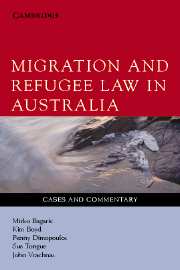Book contents
- Frontmatter
- Contents
- Detailed table of contents
- Table of cases
- Table of statutes
- 1 Thinking about migration law and national borders: An aspirational benchmark?
- 2 Introduction to Australian immigration law
- 3 Family and interdependency visas
- 4 Business and investment and skill-based visas
- 5 Temporary visas
- 6 Miscellaneous visas
- 7 Common visa requirements
- 8 Introduction to Australian refugee law: The Refugees Convention in Australian domestic law
- 9 Convention grounds
- 10 Persecution
- 11 Well-founded fear of persecution
- 12 Limits on protection of refugees: Cessation, exclusion exceptions and protection by another country
- 13 Cancellation of visas
- 14 Judicial review
- 15 Migration and human rights
- Index
1 - Thinking about migration law and national borders: An aspirational benchmark?
Published online by Cambridge University Press: 05 June 2012
- Frontmatter
- Contents
- Detailed table of contents
- Table of cases
- Table of statutes
- 1 Thinking about migration law and national borders: An aspirational benchmark?
- 2 Introduction to Australian immigration law
- 3 Family and interdependency visas
- 4 Business and investment and skill-based visas
- 5 Temporary visas
- 6 Miscellaneous visas
- 7 Common visa requirements
- 8 Introduction to Australian refugee law: The Refugees Convention in Australian domestic law
- 9 Convention grounds
- 10 Persecution
- 11 Well-founded fear of persecution
- 12 Limits on protection of refugees: Cessation, exclusion exceptions and protection by another country
- 13 Cancellation of visas
- 14 Judicial review
- 15 Migration and human rights
- Index
Summary
A framework for evaluating migration law and policy
An ideal world would be one in which all people would find roughly equal levels of resources in the places where they are born but where everybody would enjoy the right to search for better opportunities elsewhere without being impeded by the circumstances of his or her origins.
Migration and refugee law is inherently controversial. That is an underlying theme in the textbook, Migration and Refugee Law: Principles and Practice in Australia, which accompanies this case and commentary book. In the textbook, we advanced a new theoretical framework for refugee law and set out an alternative definition for a ‘refugee’.
As you read through the cases and materials in this book, you should do so with acritical and analytical mind regarding the rationale for Australian migration law and policy as a whole.
Migration law is complex and technical. Given this, most practitioners and students in this area fail to get beyond the minutiae contained in the hundreds of visa categories and the criteria within these categories. The technical nature of migration law dissuades a search for an overarching rationale for Australia's approach to immigration issues.
In this book, we discuss a large number of visa classes. Most of them do not have an obvious link with each other. Yet, given the importance of immigration to the well-being of potential immigrants and the Australian community, it would be striking if there was not an underlying unity (or at least an attempt to ground an underlying coherency) to this area of the law.
- Type
- Chapter
- Information
- Migration and Refugee Law in AustraliaCases and Commentary, pp. 1 - 27Publisher: Cambridge University PressPrint publication year: 2006



